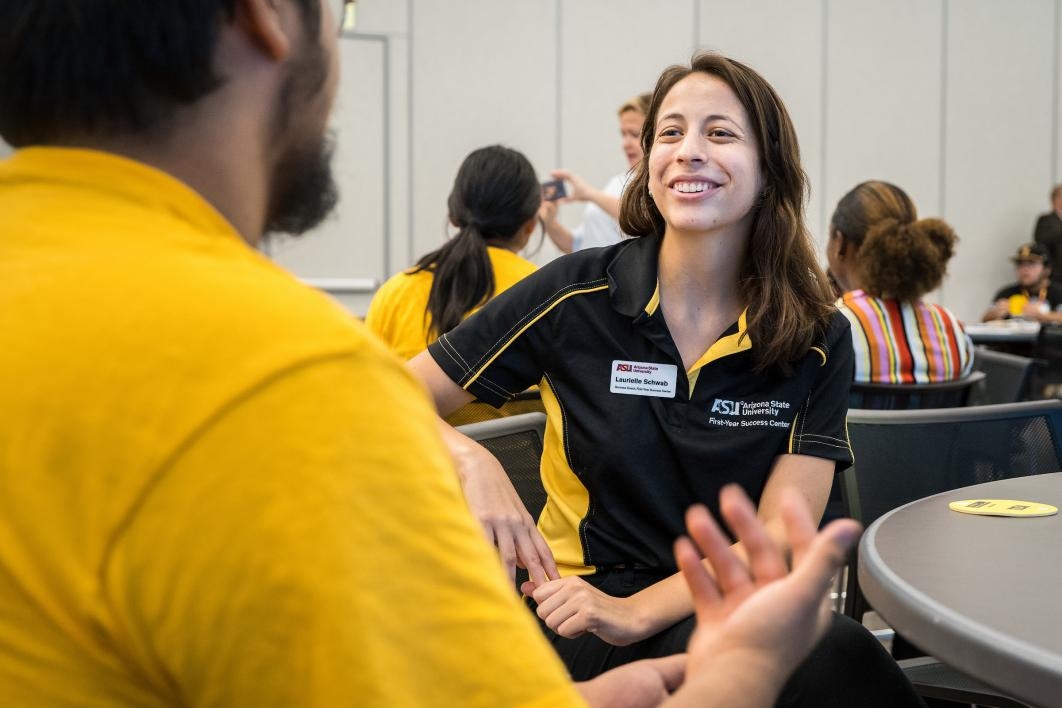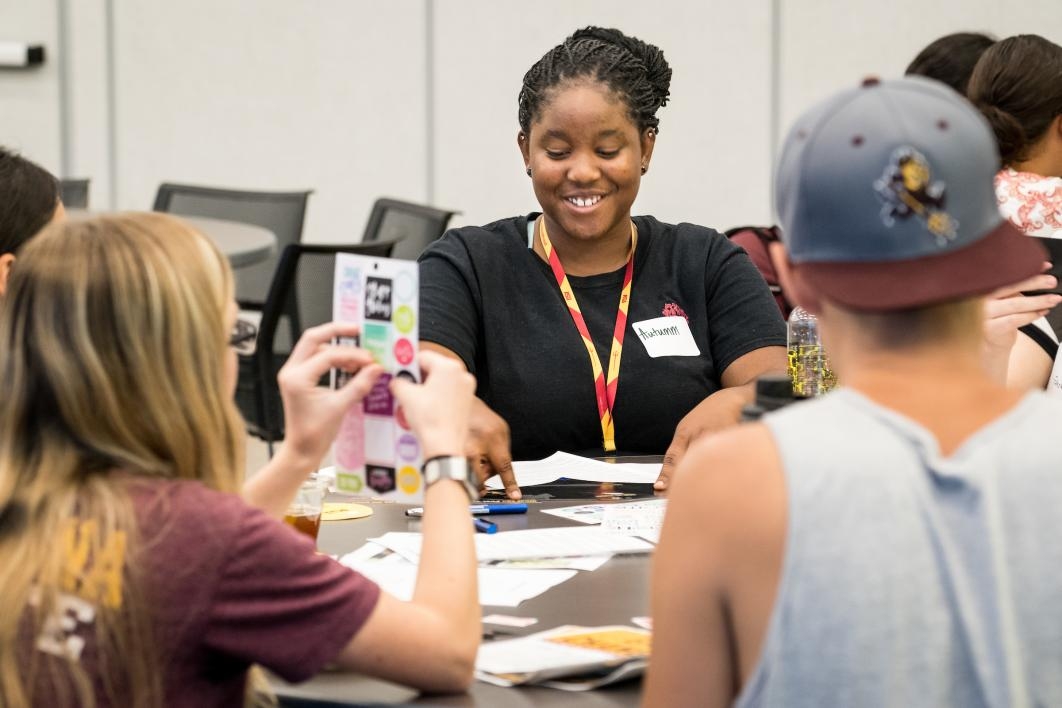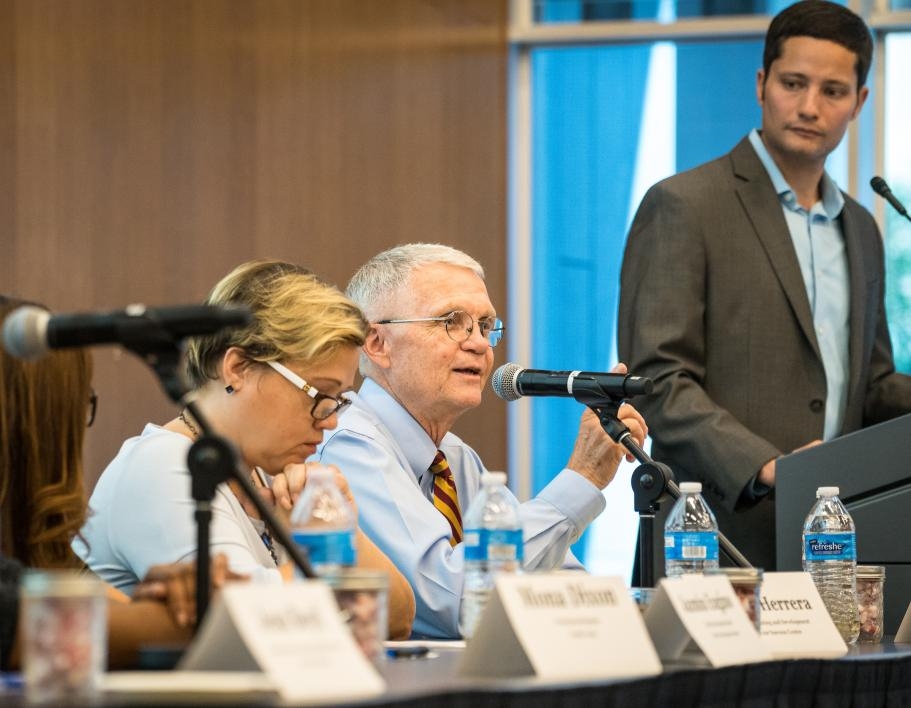First-generation students flourish at ASU with peer-coaching supports
First-in-their-family freshmen get advice, encouragement from Game Changers

Felipe Herrera is leading the way, not just for his family but also for other first-generation students at Arizona State University.
Herrera was the first in his family to go to college, and now the computer science major works as a First-Year Success coach for freshmen who are in the same place he was three years ago.
“I’m the oldest and I was the first one to go to college, and I’m kind of like the guinea pig of the family, trying things out and seeing how it goes,” he said.
“For me the biggest struggle was not having anybody to talk to about what to expect. What am I going into here?” he said of his first few weeks at ASU. But he soon connected with his First-Year Success coach, who helped him set goals and made him feel like his questions were not dumb. That interaction inspired him to become a coach himself.
“Sometimes when you’re a college student, it’s easy to feel like there’s nobody who loves or cares about you. It breaks my heart when I can tell a student is feeling that way,” Herrera said.
“I specifically tell them, ‘I’m someone who cares about you and I’ll be here to help you,’ and I can see the change in their faces,” he said.
Herrera is part of a movement, as universities recognize that they must do more to support students who are the first in their families to go to college.
ASU is ahead of the curve in serving this population of students, with higher graduation rates than the national average and a more holistic network of services, much of it thanks to the First-Year Success Center, which in 2016 started a program specifically for first-generation students called Game Changers. Last year, the initiative, which provides more than 100 hours of training to its peer coaches, racked up 4,621 coaching appointments with freshmen.
Nationwide, about a third of college students are first-generation, but only about 27 percent of them earn their degrees within four years, according to a new report released by the Center for First-Generation Student SuccessThe center is an initiative of NASPA/Student Affairs Administrators in Higher Education..
At ASU, nearly 30 percent of first-time freshmen were first-generation college students in the fall 2017 semester, the most recent statistic available. Among total enrollment at the university, including transfer students, about 35 percent were first-generation. ASU’s four-year graduation rate for this demographic is 45 percent. About 61 percent earn their degree within six years.
Game Changers reports that about 82 percent of first-generation freshmen who had coaching were registered for the fall 2018 semester, compared with 68 percent of those did not have coaching.
The population of more than 22,000 first-generation students at ASU is more than the entire undergraduate student body at the University of Southern California.
“Because of the growth of the population and the needs of the economy, we’ll have to graduate more first-generation students than we have in the past, and nationally, that’s been a lingering issue,” said Marisel Herrera, director of training and development for the First-Year Success Center.
A degree makes an enormous difference. College graduates not only have lower rates of unemployment, they also earn an average $17,500 more per year than high school graduates, according to the Pew Research Center. Graduates are also more likely to vote and to live a healthier lifestyle.
The report identified some key themes that propel first-generation students toward success, and ASU has been following those best practices — including considering “intersectionality,” or the many identities of a student, as well as shifting to an “asset-based” approach — that is, considering the strengths of the student, not the deficits.
“We’ve been utilizing these best practices and doing so at scale,” said Marisel Herrera, who is not related to Felipe Herrera.
“There are a lot of first-generation initiatives, but few are scalable, so they only touch a small percentage of the students, but we’re an exemplar of how you integrate these things.”
The Center for First-Generation and the Council for Opportunity in Education have designated Nov. 8 as First-Generation College Celebration DayNov. 8 is the anniversary of the Higher Education Act.. ASU’s First-Year Success Center is celebrating by launching a social media campaign, passing out stickers and buttons and holding two workshops on finding scholarship money.
A personalized approach
With the focus on supporting first-generation students comes the realization that they’re more than just that. They have other identities as well — gay, low-income, out-of-state or Latina.
At ASU, the peer coaches have access to their students’ demographic data, according to Kevin Correa, director of the First-Year Success Center.
“This helps them get a more holistic view of the student, so they can see that they’re maybe first-generation and a commuter student. Or first-generation and an Obama Scholar,” he said.
“They can make a more personalized approach that’s not limited to a single aspect of a student’s identity.”
Marisel Herrera was herself a first-generation college-goer. She said it’s important to recognize how the nuances of a person’s culture can affect their experience in college.
“As a Latina, some of the values I had were respect for elders and deference, and you don’t challenge somebody. Well, when you’re in a class, the professor wants you to challenge them as an indication of your engagement in learning,” she said.
“But it’s not what I’m naturally inclined to do because I’ve been taught that’s disrespectful.”
Having a success coach who recognizes those nuances is important. Shandiin Yessilth, a senior, is a success coach. When she meets with other Navajo students, she uses their shared culture as a way to bond.
“For some of them, ASU can be six hours away from home,” she said. “So I try to connect by making rez jokes and try to make them feel welcome.
“A majority of the Navajo students come from separated families and don’t always have that support.”
Yessilth, who changed her major from teaching to architecture to construction management, said she’s a coach so she can give back to her community.
“I don’t want them to go through what I did — a bunch of major hopping and feeling like there isn’t anyone to connect to,” she said.
Even though first-generation students don’t always have the guidance of someone who’s experienced in college, ASU takes an “asset-based” approach to get past stereotypes of them as having shortcomings, Correa said.
“They may lack college-going capital but they may bring aspirational capital — the idea they want to be successful and aspire to more,” he said.
“Family capital is another. They tend to be closely connected to their families, who may not know the ins and outs of going to college but they do have unconditional support and love.”
The peer coaches are trained to help freshmen find their strengths and exploit them to succeed.
Tearing down silos
The national report lists several best practices for universities to support first-generation students, which ASU has been doing for years:
• Creating a positive culture: Game Changers holds events throughout the year to celebrate first-generation students. In September, several faculty, staff and alumni who were first-generation met with freshmen to share their wisdom. Mona Dixon, who spent a childhood living in shelters with her family before earning a degree in management at ASU, is now a youth coach and is pursuing a doctorate degree. She told the young people that mindset is crucial. “If you believe you can do something, you’re right. If you believe you can’t do something, you’re right,” she said. “Everything starts with attitude.”
• Network-based programs: This means schools should offer comprehensive support.
“Students have a desire for information when they need it, not necessarily front-loaded in the first couple of weeks of school or in a summer ‘bridge’ program. They won’t maintain that information until they’re in the moment of crisis or need,” Marisel Herrera said.
“Our coaching is continuous. Students can join us at any point and it’s not locked into a cohort and we offer multiple coaching formats of phone, in-person or Google Hangouts,” she said. “We’ve had students not engage with us until the last two weeks of the semester.”
• Tearing down “silos”: ASU uses data to improve communication, Correa said.
“Any time a coach meets with a student, they’ll put a comment in the file, so if the student then meets with an academic adviser, they can see they met with their coach and what they talked about,” he said.
• Connect students with “high-impact” practices: Traditionally, first-generation students have had lower rates of studying abroad or acquiring internships. Game Changers is working to change that, not only by connecting freshmen with coaches who have had those career-boosting experiences, but also through practical help, like access to study-abroad scholarships.
Finding a balance
The key to much of this support are the peer coaches, who combine the roles of cheerleader, older sibling and guide for the freshmen. The coaches, who are juniors, seniors or grad students, help pinpoint problem areas and work on solutions.
Jordan Iglesias, who has a double major in biochemistry and women and gender studies, is the first in her family to go to college.
“I went to my First-Year Success coach when I was a freshman because the one thing that was failing was my health. I wasn’t taking care of my body,” she said.
“I was so stressed, I cried during my appointment. I was working a couple of jobs. They helped me pick up the part of my life that’s really important, my physical health,” said Iglesias, who is now a coach herself.
Iglesias and the other coaches help students find balance in their lives.
“I ask them, ‘What do you do to take care of you?’ I try to make sure every student has a coping mechanism, whether it’s meditation, going to church, reading, writing, listening to music or watching Netflix,” said Iglesias, who likes to work out to relieve stress.
About 40 percent of the peer coaches are also first-generation students, and they can relate to the unique kind of family stress that these students feel. Iglesias, who was adopted by her grandparents, financially supports her sister.
“I felt like I let my grandparents down when I told them I didn’t want to be a doctor, I want to go into policy,” she said. “It’s all on me to make sure not only that I’m successful but my sister is too.”
The Game Changers coaching is a pay-it-forward model, Iglesias said.
“I might help six students today but they’ll go out and help six of their friends, so it becomes a support system where we help each other,” she said.
Top photo: Psychology freshman Sherissa Mason decorates a paper graduation cap with motivational stickers and goals at a Game Changer program for first-generation students to mark the beginning of the semester. Photo by Charlie Leight/ASU Now


